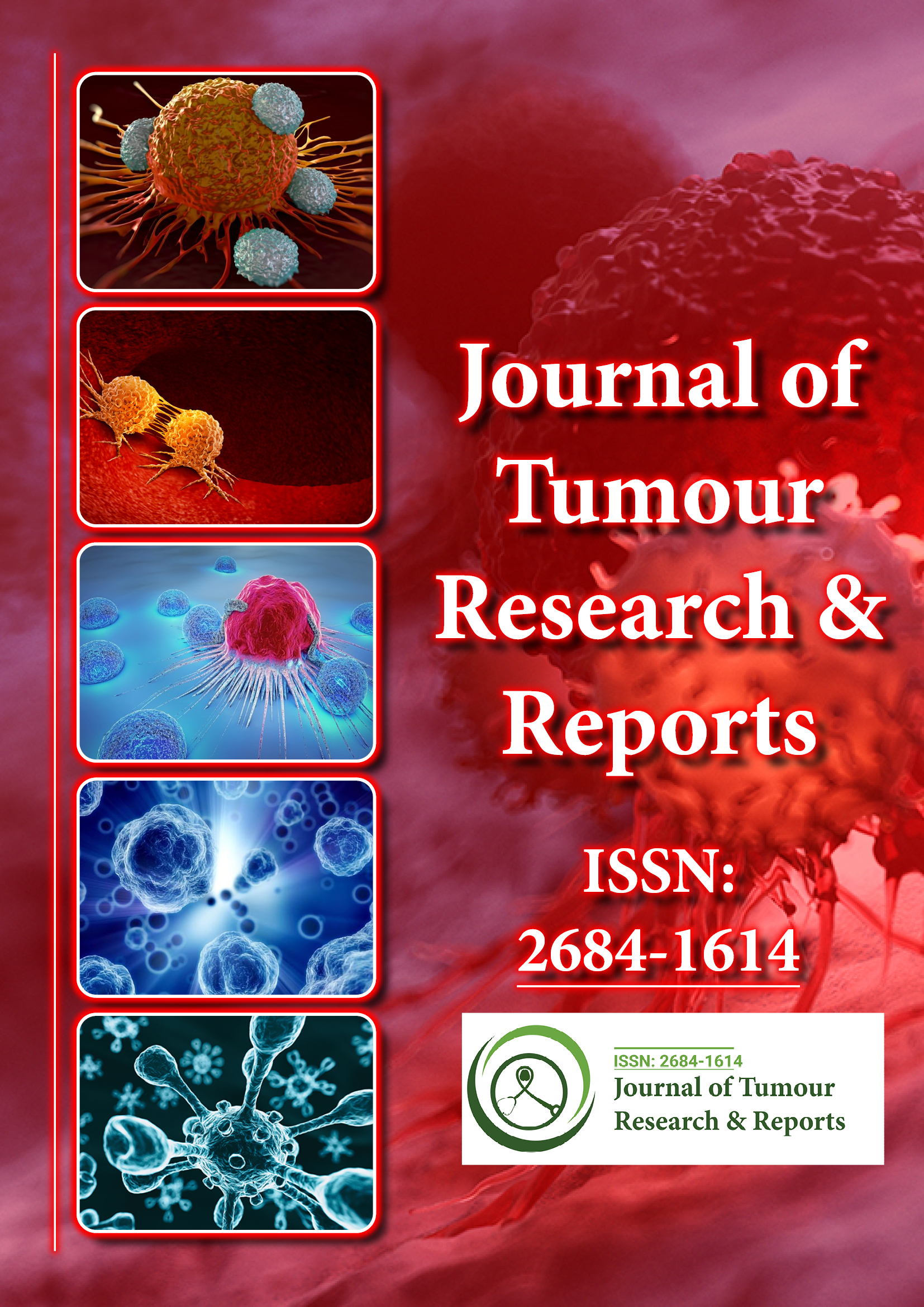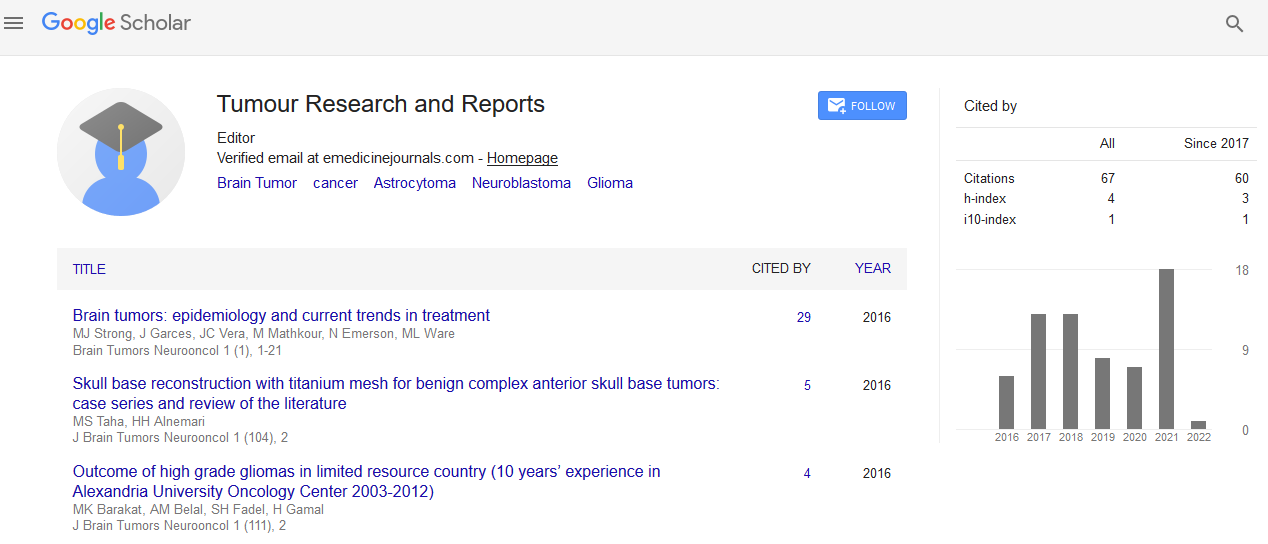Indexed In
- RefSeek
- Hamdard University
- EBSCO A-Z
- Google Scholar
Useful Links
Share This Page
Journal Flyer

Open Access Journals
- Agri and Aquaculture
- Biochemistry
- Bioinformatics & Systems Biology
- Business & Management
- Chemistry
- Clinical Sciences
- Engineering
- Food & Nutrition
- General Science
- Genetics & Molecular Biology
- Immunology & Microbiology
- Medical Sciences
- Neuroscience & Psychology
- Nursing & Health Care
- Pharmaceutical Sciences
Commentary - (2023) Volume 8, Issue 1
Comprehensive Study on Cancer Stem Cells in Tumour Progression
Ping Yang*Received: 01-Mar-2023, Manuscript No. JTRR-23-20321; Editor assigned: 03-Mar-2023, Pre QC No. JTRR-23-20321 (PQ); Reviewed: 20-Mar-2023, QC No. JTRR-23-20321; Revised: 27-Mar-2023, Manuscript No. JTRR-23-20321 (R); Published: 04-Apr-2023, DOI: 10.35248/2684-1614.23.8.181
Description
Stem cells are undifferentiated cells that can differentiate into distinct cell types and self-renew. They are required for proper tissue homeostasis and regeneration. When their usual regulatory mechanisms are disrupted, they can add to tumour initiation and progression. The function of stem cells in tumour initiation and progression will be discussed in this article.
Tumour initiation
The process by which a normal cell acquires mutations that enable it to become a cancer cell is known as tumour initiation. Because of their capacity to self-renew and differentiate into various cell types, stem cells can play a vital role in tumour initiation. This implies that a single mutation in a stem cell has the potential to generate an entire population of cancer cells.
Normal tissue stem cells can also play a role in cancer formation. Mutations in intestinal stem cells, for example, have been shown to cause intestinal tumours in rodents. Mutations in hair follicle stem cells have also been linked to the development of cutaneous tumours.
Tumour progression
Tumor progression is the process by which a cancer cell obtains new mutations that enable it to grow, invade surrounding tissue, and spread to distant locations. Stem cells can help tumours grow in a variety of ways.
One method is to keep CSCs in good working order. CSCs have been shown to play an important part in tumour progression by promoting tumour growth, invasion, and therapy resistance. CSCs are frequently resistant to chemotherapy and radiation treatment, resulting in tumour recurrence and metastasis.
Another way stem cells can add to tumour progression is by acquiring mutations in genes that control stem cell self-renewal and differentiation. Mutations in the Notch signalling pathway, which controls stem cell self-renewal, have been shown in many types of cancer to increase tumour growth and metastasis.
Finally, the tumour microenvironment can impact stem cell behaviour and accelerate tumour progression. The tumour microenvironment is made up of different cell groups, such as immune cells, fibroblasts, and endothelial cells, as well as Extracellular Matrix (ECM) components. The ECM is important in regulating stem cell behavior, and changes in the ECM can encourage tumour progression. Immune cells in the tumour microenvironment can also promote tumour development and metastasis by secreting cytokines and growth factors that promote stem cell self-renewal and differentiation. Stem cells are undifferentiated cells in the body that can develop into various kinds of cells. Stem cells have been implicated in the development and progression of tumours in some instances. Tumors are collections of abnormal cells that grow and divide uncontrollably, creating a mass or lump in the process. Tumors can be benign and non-cancerous in some instances, but malignant and cancerous in others.
Cancer Stem Cells (CSCs), a type of stem cell with the ability to self-renew and differentiate into various kinds of cancer cells, have been found in some tumors, according to research. CSCs may be involved in tumour initiation and progression, as well as resistance to chemotherapy and radiation treatment. Stem cell research is ongoing, and there is still much to learn about how they add to cancer development and progression. However, the discovery of CSCs has resulted in novel approaches to cancer treatment, such as directly targeting these cells to better patient outcomes.
Conclusion
Stem cells are essential for regular tissue homeostasis as well as tumour initiation and progression. CSCs can be formed from stem cells and can increase tumour growth, invasion, and resistance to therapy. Mutations in genes that control stem cell self-renewal and differentiation can also increase tumour progression. Finally, the tumour microenvironment has the potential to impact stem cell behaviour and contribute to tumour progression. Understanding the role of stem cells in tumour initiation and progression may lead to novel cancer prevention and treatment strategies.
Citation: Yang P (2023) Comprehensive Study on Cancer Stem Cells in Tumour Progression. J Tum Res Reports. 8:181.
Copyright: © 2023 Yang P. This is an open-access article distributed under the terms of the Creative Commons Attribution License, which permits unrestricted use, distribution, and reproduction in any medium, provided the original author and source are credited.

